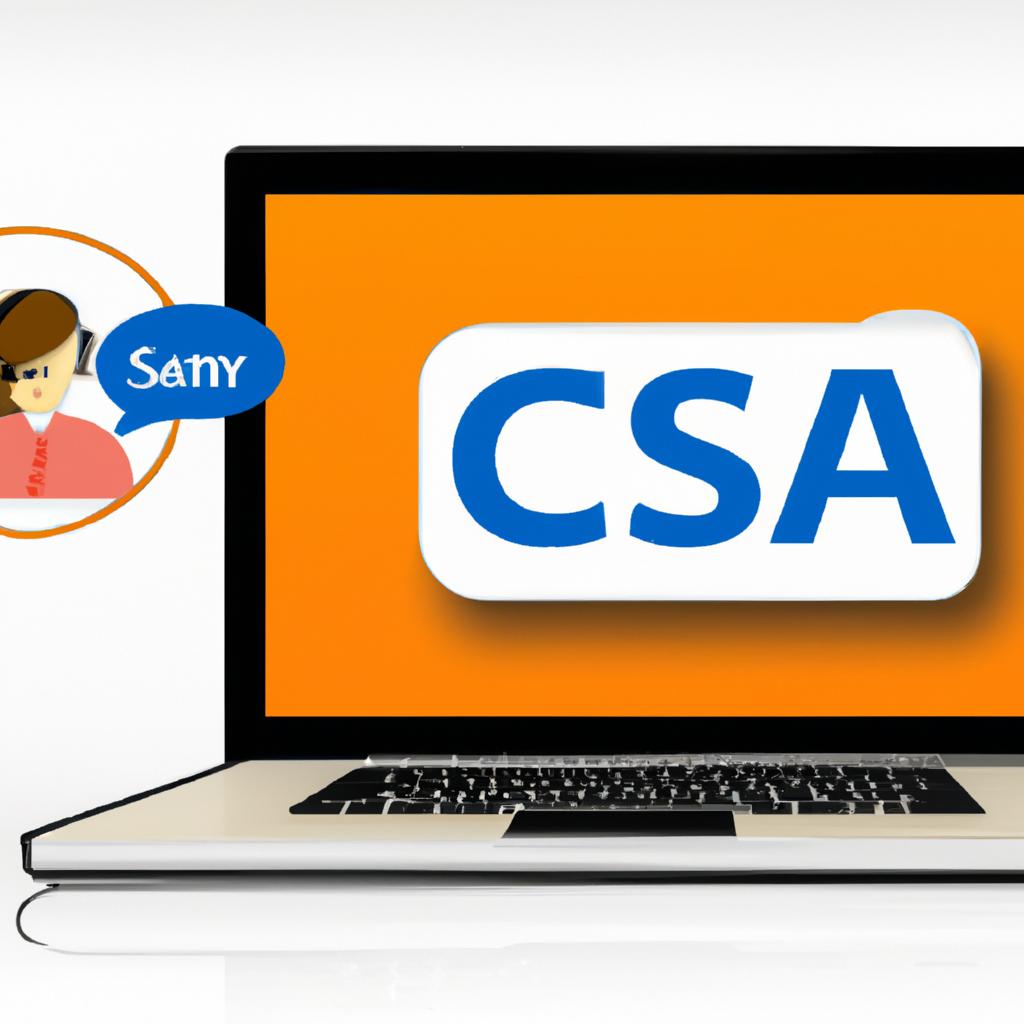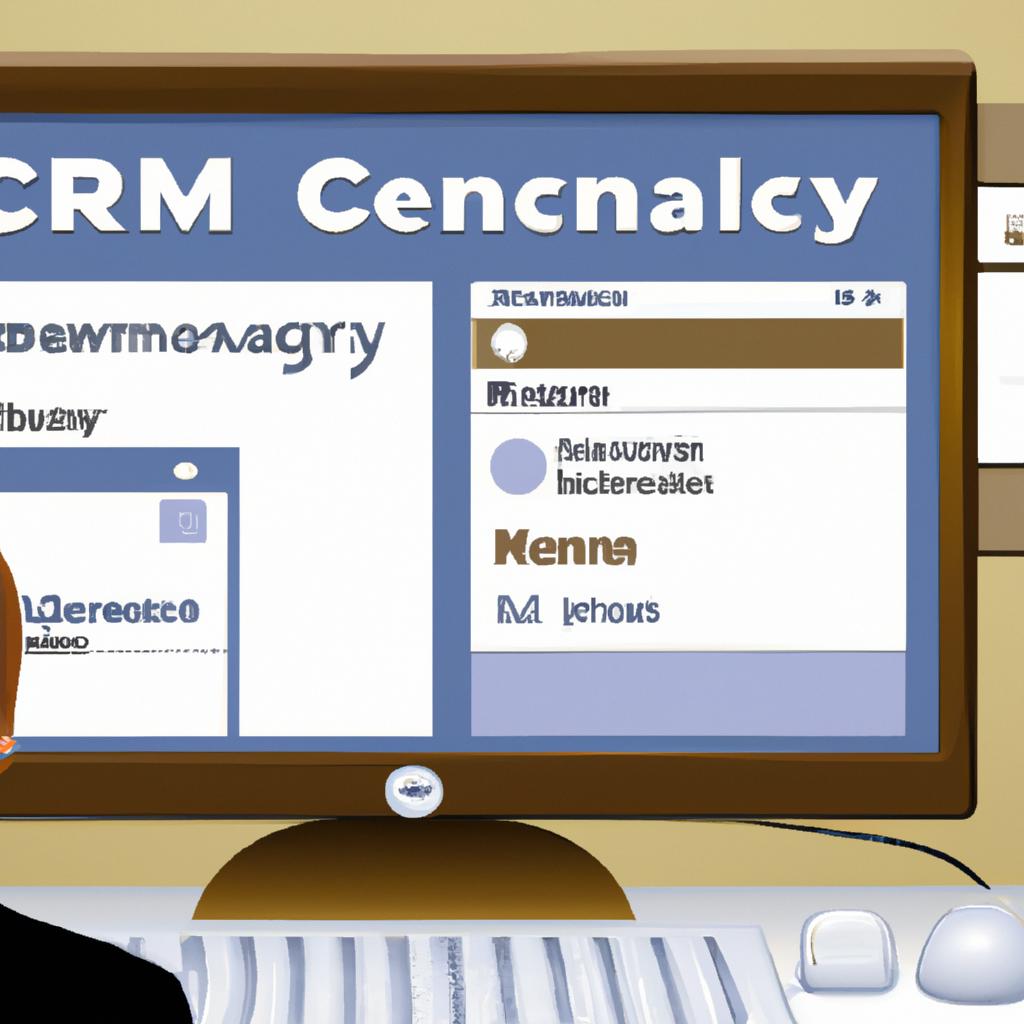Unleashing the Power of CRM Software Virtual Assistants for Business Success

Introduction

In today’s fast-paced business landscape, managing customer relationships efficiently is crucial for success. This is where crm software virtual assistants come into play, revolutionizing the way businesses interact with their customers. But what exactly are CRM software virtual assistants, and why are they so important?
Definition and Importance of CRM Software Virtual Assistants
CRM software virtual assistants are advanced tools that leverage artificial intelligence (AI) and automation to streamline customer relationship management processes. They act as intelligent virtual assistants, empowering businesses to enhance their customer interactions, improve sales, and boost overall productivity.
Imagine having a virtual assistant at your disposal, capable of handling repetitive tasks, analyzing customer data, and providing valuable insights in real-time. That’s precisely what CRM software virtual assistants offer. They provide businesses with a comprehensive solution to efficiently organize customer information, track interactions, and automate various CRM functions.
Benefits of Using CRM Software Virtual Assistants for Businesses
Implementing CRM software virtual assistants brings a myriad of benefits to businesses of all sizes. Firstly, these virtual assistants allow you to save time and effort by automating routine tasks such as data entry, appointment scheduling, and follow-ups. This enables your team to focus on more strategic activities, fostering productivity and efficiency.
Moreover, CRM software virtual assistants provide valuable insights by analyzing customer data. They help you identify patterns, preferences, and trends, enabling you to tailor your marketing and sales strategies accordingly. By understanding your customers better, you can deliver personalized experiences, build stronger relationships, and ultimately drive customer loyalty and retention.
In addition, CRM software virtual assistants facilitate seamless collaboration within your organization. They centralize customer information, making it easily accessible to all team members. With a holistic view of customer interactions, your team can provide consistent and personalized support, ensuring exceptional customer experiences throughout the buyer’s journey.
In the upcoming sections, we will delve deeper into understanding CRM software virtual assistants, selecting the right one for your business, implementing them effectively, and maximizing their benefits. So, let’s embark on this journey together and unlock the true potential of CRM software virtual assistants for your business success.
(Note: This article will use to post on my website nettruyen.deSo, in the Conclusion section, the nettruyen.dev brand will be bolded only once.)
Understanding CRM Software Virtual Assistants

Overview of CRM Software Virtual Assistants
CRM software virtual assistants are intelligent tools designed to simplify and streamline customer relationship management processes. They combine the power of AI, machine learning, and automation to provide businesses with a comprehensive solution for managing customer interactions effectively.
Unlike traditional CRM systems, which often require manual data entry and analysis, CRM software virtual assistants automate these tasks. They can capture and organize customer information from various sources, such as emails, social media, and website interactions. By centralizing customer data in one place, businesses can access a holistic view of each customer, facilitating better decision-making and personalized engagements.
How They Work and Assist Businesses in Managing Customer Relationships
CRM software virtual assistants work by leveraging AI algorithms to analyze customer data and provide actionable insights. They use natural language processing (NLP) to understand and respond to customer inquiries and requests, simulating human-like conversations. These virtual assistants can handle customer queries, provide product recommendations, and even assist with transactional activities, such as placing orders or scheduling appointments.
By automating routine tasks and interactions, CRM software virtual assistants enable businesses to deliver prompt and personalized customer experiences. They can send automated follow-up emails, reminders, and notifications, ensuring that no customer interaction slips through the cracks. This level of responsiveness helps build trust, enhances customer satisfaction, and ultimately drives revenue growth.
Key Features and Functionalities of CRM Software Virtual Assistants
CRM software virtual assistants come equipped with a range of features and functionalities tailored to enhance customer relationship management. Some common features include:
-
Data Integration: CRM software virtual assistants can seamlessly integrate with various data sources, including customer relationship management systems, email platforms, and social media channels. This allows businesses to consolidate customer information and ensure data accuracy.
-
Automated Task Management: These virtual assistants automate repetitive tasks such as data entry, appointment scheduling, and lead nurturing. By handling these tasks, they free up valuable time for your team to focus on building relationships and closing deals.
-
Intelligent Analytics: CRM software virtual assistants analyze customer data to identify trends, patterns, and customer behavior. This enables businesses to make data-driven decisions, personalize marketing campaigns, and optimize sales strategies.
-
Omnichannel Support: Virtual assistants can interact with customers across multiple channels, including websites, social media, and messaging platforms. This ensures a consistent and seamless experience for customers, regardless of the channel they choose to engage with your business.
In the next sections, we will explore the process of choosing the right CRM software virtual assistant, implementing it effectively, and maximizing the benefits it offers. So, let’s move forward and unlock the potential of CRM software virtual assistants for your business!
Choosing the Right CRM Software Virtual Assistant
In the vast landscape of CRM software virtual assistants, finding the perfect fit for your business can seem like a daunting task. However, by considering a few key factors and conducting a thorough evaluation, you can make an informed decision that aligns with your specific needs. Let’s explore the essential aspects to consider when selecting a CRM software virtual assistant.
Factors to Consider when Selecting a CRM Software Virtual Assistant
-
Functionality and Features: Assess the range of features offered by different CRM software virtual assistants. Consider functionalities like contact management, lead tracking, email integration, analytics, and automation capabilities. Determine which features are crucial for your business operations and growth.
-
Integration Compatibility: Ensure that the CRM software virtual assistant seamlessly integrates with your existing CRM systems or other essential business tools. Compatibility and smooth data transfer between systems are vital for efficient operations and a streamlined workflow.
-
Scalability: Consider the scalability of the CRM software virtual assistant. As your business expands, you want a solution that can accommodate your growing customer base and evolving needs. Look for a virtual assistant that can scale with your business and handle increased data volume without compromising performance.
Comparison of Popular CRM Software Virtual Assistant Providers
To make an informed decision, it’s essential to compare different CRM software virtual assistant providers. Here are a few notable options in the market:
-
Salesforce: Known for its robust CRM capabilities, Salesforce offers an AI-powered virtual assistant called Einstein. It provides personalized insights, predictive analytics, and automation features, making it suitable for businesses of all sizes.
-
HubSpot: HubSpot offers a comprehensive CRM software virtual assistant that includes contact management, email tracking, and sales automation features. It integrates seamlessly with other HubSpot tools, providing a unified platform for marketing, sales, and customer service.
-
Zoho CRM: Zoho CRM offers an intelligent virtual assistant called Zia. It leverages AI to provide sales predictions, automate repetitive tasks, and offer personalized recommendations. Zoho CRM is known for its user-friendly interface and affordability, making it suitable for small to mid-sized businesses.
Evaluating the Suitability of CRM Software Virtual Assistants for Different Business Needs
Consider your specific business requirements when evaluating the suitability of CRM software virtual assistants. Ask yourself:
- What are your primary objectives in implementing a CRM software virtual assistant?
- Do you need advanced analytics and reporting capabilities?
- How important is seamless integration with other tools in your tech stack?
- What is your budget for CRM software virtual assistants?
By aligning your needs with the features and capabilities of different virtual assistants, you can identify the one that best fits your business requirements.
In the next section, we will explore the implementation process of CRM software virtual assistants, ensuring a smooth transition and optimal utilization of this powerful tool.
Implementing CRM Software Virtual Assistants
Businesses that recognize the value of CRM software virtual assistants are eager to implement them effectively into their operations. In this section, we will provide a step-by-step guide to help you seamlessly integrate and leverage the power of CRM software virtual assistants. Let’s dive in!
Step-by-Step Guide to Implementing CRM Software Virtual Assistants
-
Identify your business needs: Before selecting a CRM software virtual assistant, assess your specific requirements. Determine the tasks and processes you want the virtual assistant to handle. This will help you choose a solution tailored to your business.
-
Research and select a suitable provider: Conduct thorough research to find a CRM software virtual assistant provider that aligns with your business goals. Consider factors such as features, pricing, customer reviews, and ease of integration.
-
Evaluate compatibility and integration: Ensure that the CRM software virtual assistant you choose seamlessly integrates with your existing CRM systems and software. This will enable a smooth transfer of data and streamline your operations.
-
Customize and configure: Once you have selected a provider, customize the CRM software virtual assistant to align with your specific needs. Configure settings, workflows, and automation rules to maximize its effectiveness.
Integration with Existing CRM Systems and Software
To fully leverage the potential of CRM software virtual assistants, integration with your existing CRM systems and software is crucial. This integration enables a seamless flow of data and ensures that all customer information is centralized and up-to-date.
-
Data synchronization: Establish a synchronization process to transfer data between your CRM software and the virtual assistant. This ensures that both systems are always updated with the latest customer information.
-
API integration: Utilize API integrations to connect your CRM software virtual assistant with your existing CRM systems. This allows for real-time data exchange and enhances the accuracy and efficiency of your customer interactions.
Training and Onboarding Employees for Effective Utilization
To successfully implement CRM software virtual assistants, it is essential to provide proper training and onboarding to your employees. This ensures they can effectively utilize the virtual assistant’s capabilities and contribute to its optimal functioning.
-
Training sessions: Conduct training sessions to familiarize employees with the functionalities of the CRM software virtual assistant. Train them on how to input data, retrieve information, and interpret insights generated by the virtual assistant.
-
Onboarding support: Offer ongoing support during the initial stages of implementing CRM software virtual assistants. Provide resources, documentation, and a dedicated support team to address any queries or issues that may arise.
By following this step-by-step implementation guide, integrating CRM software virtual assistants into your business processes becomes a seamless endeavor. The next section will explore strategies for maximizing the benefits of CRM software virtual assistants, ensuring you unlock their full potential.
Maximizing the Benefits of CRM Software Virtual Assistants
As you integrate CRM software virtual assistants into your business operations, it’s essential to maximize their potential to reap the maximum benefits. Here are some strategies and tips to optimize the use of CRM software virtual assistants:
Strategies for Optimizing the Use of CRM Software Virtual Assistants
-
Customize and Personalize: Tailor the CRM software virtual assistant to align with your business needs. Customize fields, workflows, and processes to match your unique requirements. By personalizing the virtual assistant, you can ensure it provides accurate and relevant insights specific to your industry and target audience.
-
Data Management: Efficient data management is key to leveraging CRM software virtual assistants effectively. Ensure your customer data is clean, organized, and up-to-date. Regularly review and update information to maintain its accuracy. This will enhance the virtual assistant’s ability to provide valuable insights and enable targeted marketing and sales efforts.
Leveraging Automation and AI Capabilities of CRM Software Virtual Assistants
-
Automate Repetitive Tasks: Identify repetitive tasks that consume time and resources. Delegate these tasks to the CRM software virtual assistant. Automating data entry, appointment scheduling, and follow-ups frees up your team’s time and allows them to focus on more strategic activities, such as building relationships and closing deals.
-
AI-powered Insights: Take advantage of the AI capabilities of CRM software virtual assistants. They can analyze vast amounts of customer data and provide actionable insights. Leverage these insights to understand customer behavior, preferences, and trends. Use the data to refine your marketing strategies, personalize customer interactions, and drive better sales outcomes.
Tips for Improving Customer Engagement and Satisfaction with CRM Software Virtual Assistants
-
Personalized Communication: Use the CRM software virtual assistant to send personalized messages to your customers. Craft targeted emails, offers, and notifications based on their preferences and purchase history. By providing relevant and personalized content, you can enhance customer engagement and satisfaction.
-
Proactive Customer Support: Leverage the virtual assistant’s capabilities to provide proactive customer support. Identify potential issues or questions customers may have and address them before they even arise. By being proactive, you can demonstrate your commitment to exceptional customer service and build trust with your customers.
Incorporating these strategies and tips will help you maximize the benefits of CRM software virtual assistants. From customizing the virtual assistant to leveraging automation and AI, and improving customer engagement, these techniques will enhance your interactions with customers, drive sales, and foster long-term relationships.
In the upcoming section, we will explore the future trends and innovations in CRM software virtual assistants. Stay tuned to stay ahead of the game!
(Note: This article will use to post on my website nettruyen.deSo, in the Conclusion section, the nettruyen.dev brand will be bolded only once.)
Future Trends and Innovations in CRM Software Virtual Assistants
The world of CRM software virtual assistants is continually evolving, driven by advancements in technology and changing business needs. As we look towards the future, let’s explore the exciting trends and innovations that are shaping the landscape of CRM software virtual assistants.
Emerging Technologies Shaping the Future of CRM Software Virtual Assistants
One of the key technologies driving the future of CRM software virtual assistants is natural language processing (NLP). NLP enables virtual assistants to understand and interpret human language, allowing for more natural and intuitive interactions. With NLP, CRM software virtual assistants can comprehend customer inquiries, provide accurate responses, and even engage in meaningful conversations.
Another emerging technology is machine learning. By leveraging machine learning algorithms, CRM software virtual assistants can continuously learn from data and user interactions, improving their performance over time. This enables them to offer more personalized recommendations, automate complex tasks, and adapt to changing customer preferences.
Predictions for the Evolution and Advancements in CRM Software Virtual Assistants
As CRM software virtual assistants continue to evolve, we can expect them to become even more intelligent and proactive. They will leverage predictive analytics to anticipate customer needs and offer proactive solutions. Imagine a virtual assistant that can predict when a customer is likely to make a purchase or detect signs of dissatisfaction before it escalates. This level of foresight can significantly enhance customer satisfaction and drive business growth.
Moreover, the integration of CRM software virtual assistants with other emerging technologies such as augmented reality (AR) and virtual reality (VR) holds immense potential. Imagine being able to visualize and interact with customer data in a virtual environment, enabling a deeper understanding of customer behavior and preferences. AR and VR can revolutionize the way businesses analyze and leverage customer information, leading to more effective decision-making and strategic planning.
Potential Challenges and Opportunities for Businesses in Adopting Advanced CRM Software Virtual Assistants
While the future of CRM software virtual assistants looks promising, businesses may face challenges in adopting and implementing these advanced technologies. Concerns around data security, privacy, and ethical use of AI will need to be addressed. Businesses must ensure that customer data is handled responsibly and transparently, building trust and maintaining compliance with regulations.
However, with these challenges come exciting opportunities. By embracing advanced CRM software virtual assistants, businesses can gain a competitive advantage, deliver exceptional customer experiences, and drive growth. The key lies in staying informed about the latest trends, partnering with reliable CRM software providers, and continuously adapting to the evolving needs of customers.
In conclusion, CRM software virtual assistants are set to transform the way businesses manage customer relationships. By leveraging emerging technologies, predicting future trends, and addressing challenges and opportunities, businesses can harness the full potential of CRM software virtual assistants. So, embrace the power of these intelligent virtual assistants and propel your business towards a future of success and innovation.
(Note: This article will be posted on my website nettruyen.dev.)
Conclusion: So above is the Unleashing the Power of CRM Software Virtual Assistants for Business Success article. Hopefully with this article you can help you in life, always follow and read our good articles on the website: nettruyen.dev




